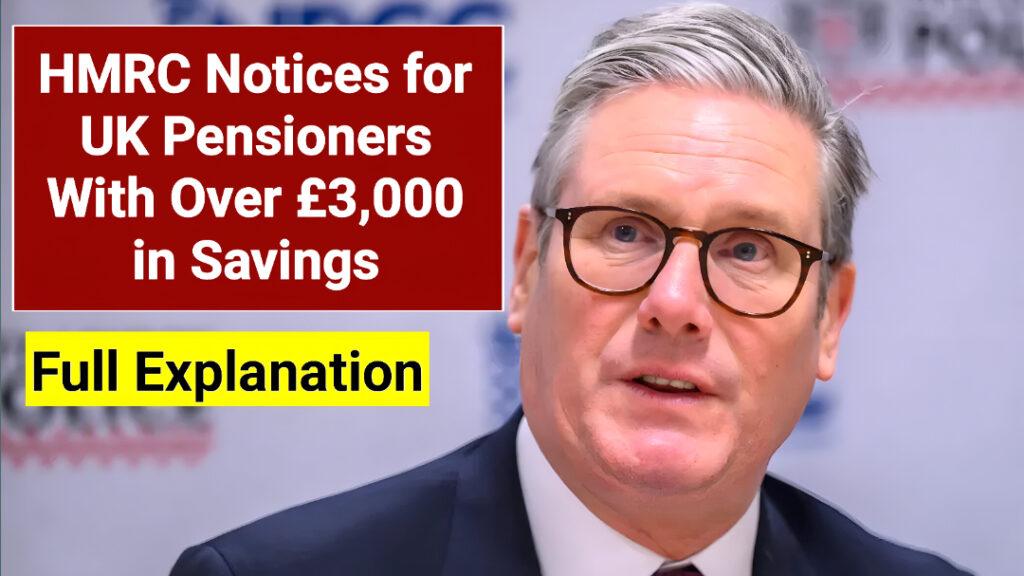HMRC Notices for UK Pensioners: UK pensioners with savings over £3,000 may receive HMRC notices regarding taxes, benefits, or pension adjustments. These letters can be confusing and sometimes alarming, but understanding them is key to staying compliant and managing your finances efficiently. This guide explains who receives these notices, why they are issued, and how pensioners can respond without stress.
Who Receives HMRC Notices
HMRC sends notices to pensioners who have savings above £3,000, including interest from bank accounts, ISAs, or other investments. Notices may relate to tax adjustments, pension income reporting, or state benefits that require updated financial information. The notices are meant to ensure accurate taxation and correct benefit allocation.
Types of HMRC Notices for Pensioners
Common notices include Self Assessment requests, P60/P45 adjustments, tax code changes, and pension income verification letters. Some letters may request additional documentation or clarification regarding savings, interest earned, or other income. Understanding the type of notice is crucial before taking any action to avoid penalties.
Why HMRC Issues These Notices
HMRC issues notices to ensure pensioners with savings above £3,000 are correctly taxed and to verify eligibility for certain benefits. These notices help prevent underpayment or overpayment of tax and maintain proper pension records. Compliance ensures peace of mind and avoids fines or complications in future financial matters.
How to Check if the Notice is Legitimate
Pensioners should verify the authenticity of any HMRC notice by checking the sender, reference number, and official HMRC website. Fraudulent letters may appear similar to official correspondence, so it’s important not to provide personal information or payment details without confirmation. Contacting HMRC directly can clarify doubts.
How to Respond to HMRC Notices
Respond promptly to HMRC notices with accurate information. Gather bank statements, savings account summaries, pension documents, and tax records. Reply online through the official HMRC portal, by phone, or via post, depending on the instructions in the notice. Timely responses prevent penalties and ensure correct tax calculations.
Impact on Pension Income and Benefits
HMRC notices can affect state pension payments, tax codes, or entitlement to benefits. Reporting savings above £3,000 accurately ensures pensioners do not lose benefits or face unexpected tax bills. Correctly managing responses also helps maintain eligibility for allowances like Pension Credit or Winter Fuel Payments.
Tips to Avoid Future Notices
Keep accurate financial records, report interest income promptly, and update HMRC with changes in savings or pensions. Using online accounts for HMRC and banks can simplify record-keeping and reduce the likelihood of receiving notices unexpectedly. Staying organized is key for stress-free financial management.
Common Mistakes to Avoid
Many pensioners make mistakes such as ignoring letters, providing incomplete documents, or failing to declare all savings. These errors can lead to fines, delayed benefits, or increased scrutiny from HMRC. Ensuring complete and accurate reporting avoids complications.
Support and Assistance for Pensioners
Pensioners can seek help from HMRC helplines, citizen advice bureaus, or financial advisors. Family members or carers can assist with online forms and document preparation. Professional guidance ensures pensioners respond correctly and fully understand the implications of HMRC notices.
Conclusion
Receiving an HMRC notice can be stressful, but pensioners with savings above £3,000 can handle them confidently by understanding the type of notice, responding promptly, and keeping accurate records. Proper management ensures compliance, protects benefits, and prevents unnecessary stress while maintaining financial security in retirement.
